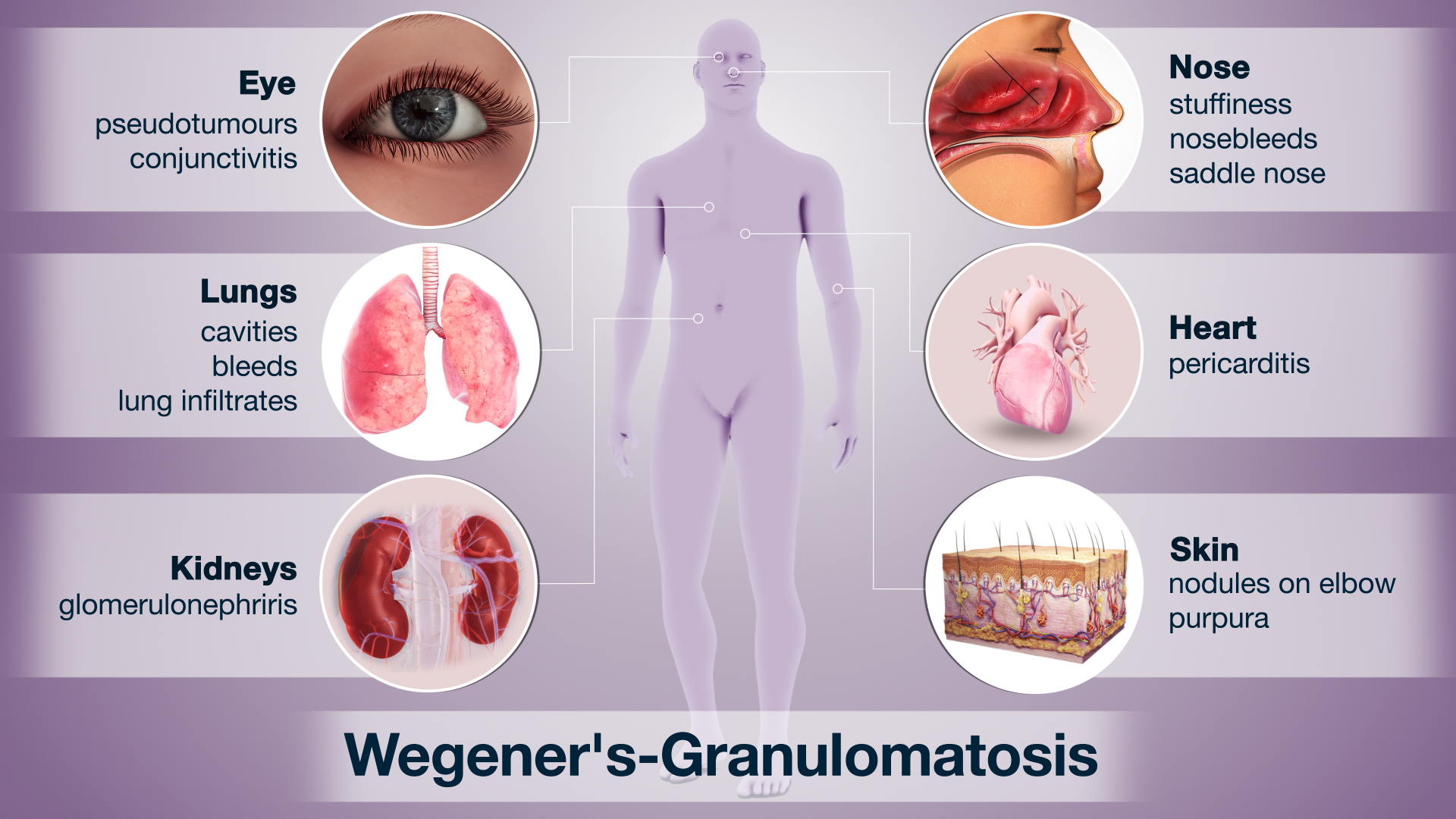Wegner’s granulomatosis, or otherwise known as Granulomatosis with Polyangiitis (GPA) is a rare disease in which patient experiences inflammation and damage in the smaller blood vessels, in several organs like kidneys, sinuses, throat, nose, or lungs. This inflammation slows down or prohibits the flow of blood and sufficient oxygen to the patient’s organs and tissues. Wegner’s granulomatosis, or otherwise known as Granulomatosis with Polyangiitis (GPA) is a rare disease in which patient experiences inflammation and damage in the smaller blood vessels, in several organs like kidneys, sinuses, throat, nose, or lungs. is one of the several types of vasculitis, an inflammation of the blood vessels. The inflamed tissue lumps are called granulomas, which cover blood vessels and have the capability to damage the organs of the patient, but can be cured completely with proper treatment.

Symptoms
The first signs of the disease can emerge suddenly or may take a few months. The first organs to take the toll of the disease are nose, sinuses, lungs, and throat, with the condition worsening off rapidly. The blood flow is hindered and the organs and blood vessels are affected drastically, majorly kidneys.
The common signs and symptoms of GPA are as follows:
- Fever
- Fatigue
- Night sweats
- Persistent ill-feeling, otherwise known as malaise
- Weight loss
- Aches and pain all over the body
Confirmatory symptoms of the disease are:
- Bleeding nose and crusting, pus-like drainage from the nose
- Stuffiness in the nose, sinus infections, runny nose
- Coughs, bloody phlegm, short-breaths, wheezing
- Numbness in fingers, limbs or toes of the patient, shooting pain in arms, legs, feet or hands
- Traces of blood in the urine
- Ear inflammation and problems while hearing, ear infection
- Redness in eyes, vision changes, eye inflammation, pain or burning sensation in eyes
- Sores, rashes, or bruises on the skin
- Swelling in joints with pain
It has been observed that this disease affects the lungs in some people, while it affects the kidney in others. Without proper treatment, the patient can experience organ failures such as lung or kidney failure.
Causes
As per medical resources, the main cause behind the occurrence of Wegener's-Granulomatosis hasn’t been found yet. These resources claim that it is an auto-immune disease, while there is no conclusive evidence that Wegener's-Granulomatosis is inherited. Resources also claim that the disease isn’t contagious.
In this rare type of medical disorder, the immune system mistakenly perceives healthy blood vessels of a patient’s body as intruders and tries to kill them by attacking. Some researches claim that infections may play a significant role in triggering the disease, as this phenomenon of attack by the immune system occurs when bacteria or viruses trying to get into the body of a healthy person. This attack is the main reason behind the inflammation of the blood vessels and thus damage is made to healthy blood vessels.
Wegner’s granulomatosis disease can infect a person of any age but is usually seen in people of ages between 40 and 65.
Treatment
This disease can cause severe permanent damage to the patient’s organs but can be cured through doctor-prescribed long-term treatments. The doctor may recommend the following medications to the patient including:
- Anti-inflammatory medications: Doctors have been seen to recommend corticosteroids like prednisone, in the majority of the cases to counter inflammation. They can also combine it with cyclophosphamide. However, these medications have many side effects.
- Chemotherapy drugs like rituximab (Rituxan)
- Immune suppressing drugs: If the disease isn’t severe as such, then doctors may recommend methotrexate combined with prednisone. Other notable immune-suppressing drugs are cyclophosphamide and azathioprine (Imuran and Azasan). However, this medication is known to have fewer side effects than others.
Notable side-effects of the disease include weakening of bones and reduced ability of patient fighting infection. The disease can also affect the patient’s lungs, which could be treated through doctor-recommended antibiotics combinations such as sulfamethoxazole-trimethoprim (Bactrim, Septra) to prevent infection of any kind. Due to its notable side effects, continuous and proper monitoring of the patient is required.
Disclaimer: The information in no way constitutes, or should be construed as medical advice. Nor is the above article an endorsement of any research findings discussed in the article an endorsement for any of the source publications.








